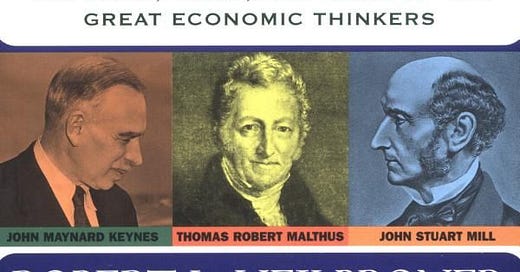The Men Who Shaped The World
Adam Smith has had more influence on the world than Alexander The Great. Karl Marx has had more influence on the world than Genghis Khan. But most people do not understand their ideas.
In 1776, 13 colonies decided they would be independent from the British Crown. In 1776, you could bet these colonies would never amount to much, or at least they would never surpass the British. This was the heyday of the Empire. The British Crown was superior to these colonies in nearly every measure. These colonies called themselves The United States of America. They adopted a democratic system of governance. Beyond the political system, they were also huge on another idea- capitalism. The same year they declared independence, Adam Smith published his book, The Wealth of Nations. A book that was seminal in pushing this idea further. Today, the United Kingdom, The Crown, is worth $3 trillion, and the GDP of the United States is $23 trillion. The United States is more powerful than the United Kingdom in every way. So many factors account for this reversal of places, but economics is one of the chief factors. It began with the foundational economic idea of the United States of America.
Adam Smith never learned to handle a gun but conquered the world. He never commandeered any army unit, but his reach was more extensive than Alexander the Great's. Smith and other figures in this book prove that the pen is mightier than the sword.
Today, from Indonesia to Botswana to China to Chile to India, Adam Smith's ideas determine the faith of billions of people. Those who follow his ideas are reaping the fruits he said they would reap; those who ignore his are also reaping the fruits he said they would reap. You can't ignore Adam Smith.
But who was Adam Smith? How did he live?
This book is an attempt to shine a light on Adam Smith. But not just Adam Smith, but also Karl Marx. David Ricardo. John Maynard Keynes. Thorstein Veblen. Thomas Malthus. John Stuart Mill. Joseph Schumpeter. Charles Fourier.
To understand some ideas, we must understand the times and the background of the figures who developed those ideas. Without the War and the Great Depression, it is possible that John Maynard Keynes would not develop the ideas we now call Keynesian principles. He shaped the ideas, but the times also developed him. Without the massive industrial changes that happened with many people becoming rich and the working class remaining largely poor, it is possible that Karl Marx would not have developed the ideas we now understand to be communism. He shaped the ideas, but the times also shaped him.
I enjoyed this book because it was more than a biography of individuals or ideas. It is a biography of both. We can imagine Adam Smith taking walks in his unattended dress and developing the idea that would change the world. We can imagine Karl Marx working hard, researching, and digging the papers to develop his ideas.
This book answers an essential question of why economics did not develop until the 17th Century. Simply put, the ideas of citizenship and governments needed for development and economic progress were unavailable before that era. For most of history, governments controlled every individual within their territories. The idea of personal freedom was simply an imagination. Citizens' rights were a fiction of the imagination. The ideas of citizens' rights did not mature until the 17th Century. When the maturity happened, it changed everything. Technological advancement caused the spark that forced the philosophers to provide.
The author rises above ideological divides and provides a healthy view of each character he chronicles. All of them were interesting; some were idiots, others were funny, while others were debtors, and some were rich, but all pursued their ideas with intellectual ferocity. Standing in the 21st Century, we can see the impact of their ideas. Ideas have consequences.
Robert Heilbroner is reflecting, and he has invited us to the feast. You will enjoy it if you enjoy economics. You will enjoy it if you are curious about the economic ideas that shaped our world. You will enjoy it if you are curious about the individuals who shape our world. Adam Smith has had more influence on the world than Alexander The Great. Karl Marx has had more influence on the world than Genghis Khan. But most people do not understand their ideas very well. Robert will deliver you from this.





Wow! I want to read this
The very thought that struck my mind when I read that Adam Smith's "The Wealth of Nations" was published the same year America declared Independence:
"To understand some ideas, we must understand the times and the background of the figures who developed those ideas."